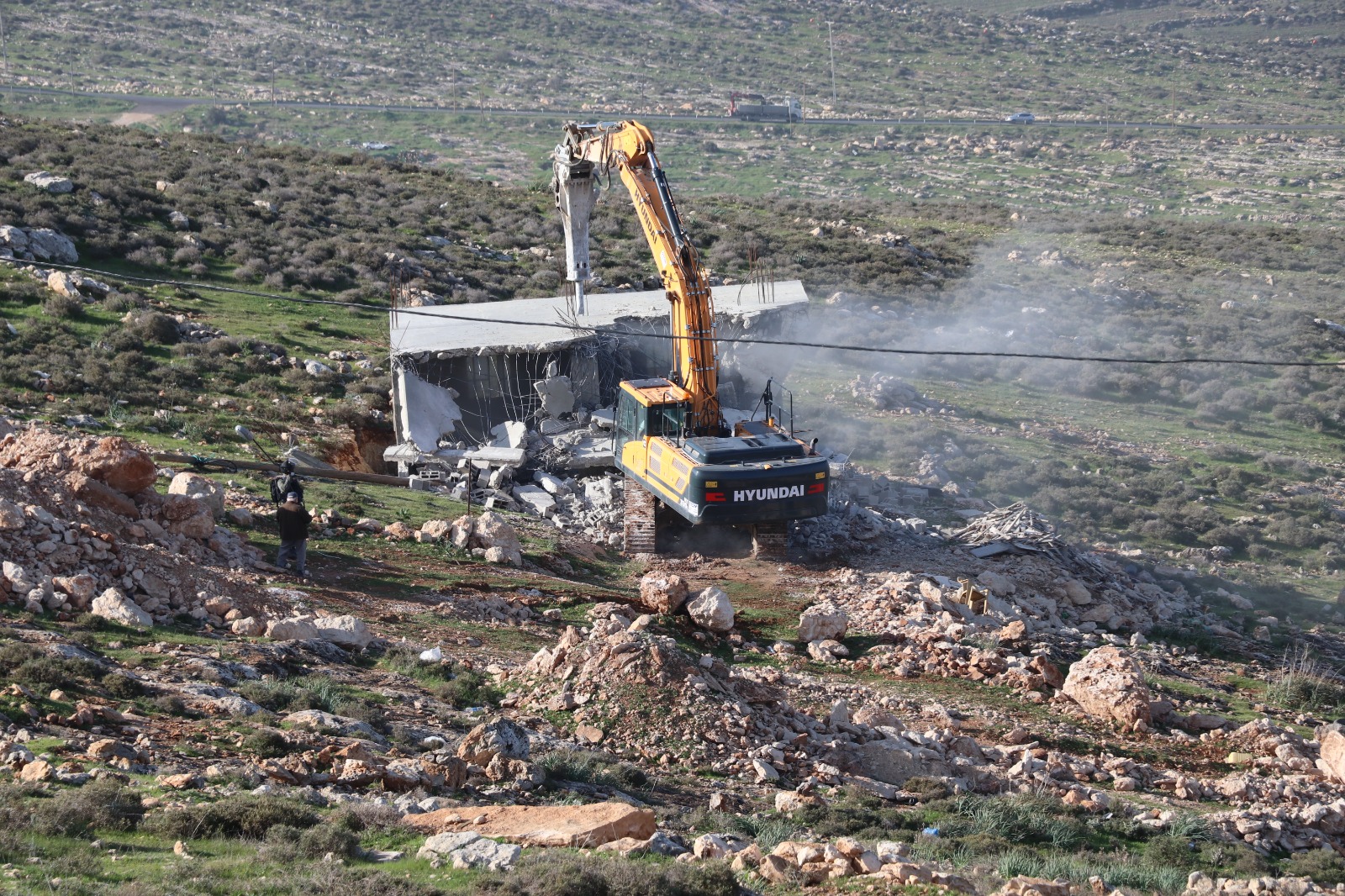
The Palestinian Centre for Human Rights (PCHR) expresses deep concern over the Israeli Occupation Forces (IOF)’s measures and policies aimed at altering demographic dynamics in Hebron, south of the West Bank. These actions include the establishment of new settlement outposts, the expansion of existing settlements, and the imposition of new realities on the ground. This coincided with the IOF’s ongoing military aggression against the Gaza Strip for over 15 months.
According to PCHR researchers, the Israeli authorities have recently intensified Palestinian home demolitions in Hebron, which has faced escalating attacks throughout 2024, including land confiscations, settlement expansion, the establishment of new pastoral and agricultural settlement outposts, and the closure of Hebron’s Old City, classified as Area “H2.”
Based on PCHR’s field documentation, throughout 2024, the Israeli authorities have demolished 175 houses and civilian facilities in Hebron and given the green light for expanding existing settlements and imposing new realities on the ground in various forms.
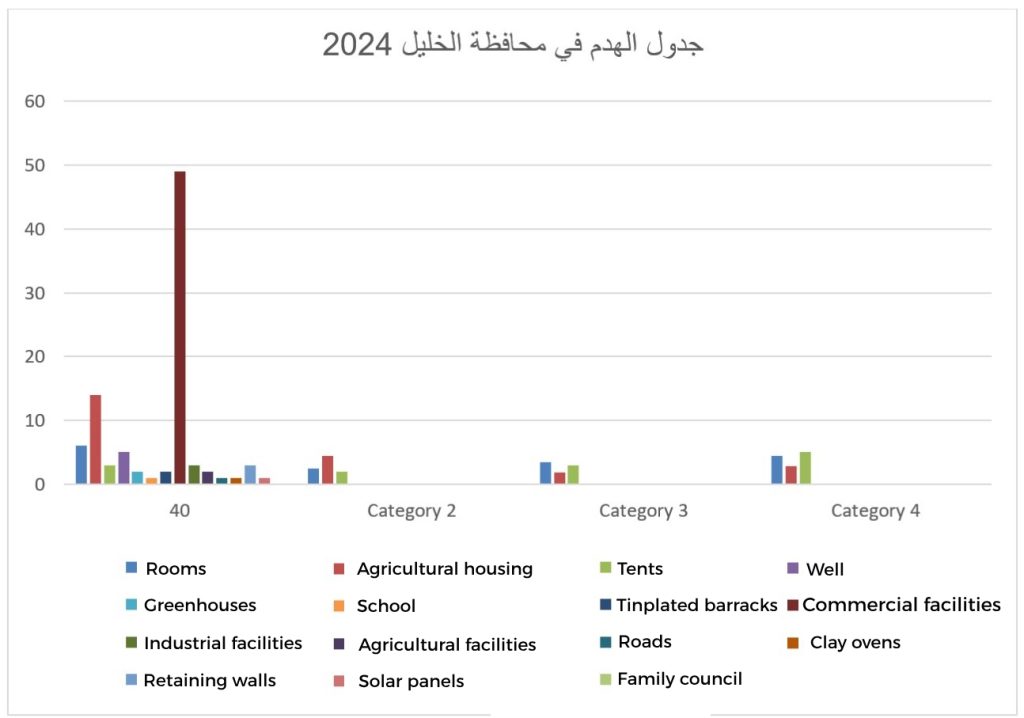
Settlement Outposts
According to PCHR’s researchers, Israeli settlers established 14 new settlement outposts in areas classified as Area (C) in Hebron throughout 2024, bringing the total number of settlement outposts in Hebron to 47. Of these, 14 were established between 2020 and 2023, while 19 date back to before 2006.1
The new settlement outposts included pastoral outposts, where settlers placed livestock barracks that damaged Palestinians’ wheat and barley crops, and agricultural outposts, where settlers planted various crops, including vineyards, as documented by our field researchers.
The new settlement outposts were established when Israeli settlers set up tents, caravans, or livestock barracks on Palestinian-owned lands, gradually expanding their presence. They also carry out attacks on Palestinians, their homes, and properties, seeking to legitimize these actions through state-backed decisions. It is worth noting that some of these outposts are later transformed into settlements.
Last year, Israeli settlers seized many Palestinian-owned lands; most notably Khelet Taha area in southern Dura City, southwest of Hebron, where they had a firm grip on Palestinian-owned mountain lands, set up mobile caravans, planted about 400 dunams of land with grape seedlings, constructed and paved 1.5-kilometer-long road. In the Khelet Taha area, the Israeli authorities also demolished Palestinians’ homes and denied them access to their lands.
In this regard, Izzat ‘Odah said to PCHR’s fieldworker:
“I live in Kherbat Salama village, southwest of Dura. My brothers and I own agricultural land in the Khelet Taha area, where Israeli settlers set up a settlement outpost two years ago and placed iron caravans in 2024. The settlers also had a firm grip on part of Khelet Taha area and Um Hathora area, where they set up iron caravans and planted three agricultural fields with grapevines, denying Palestinians’ access to their lands. Near Kherbat Salama village is “Negohot” settlement, which was established in the late 1980s on one of the nearby mountains and on part of Faqiqas village’s lands.”
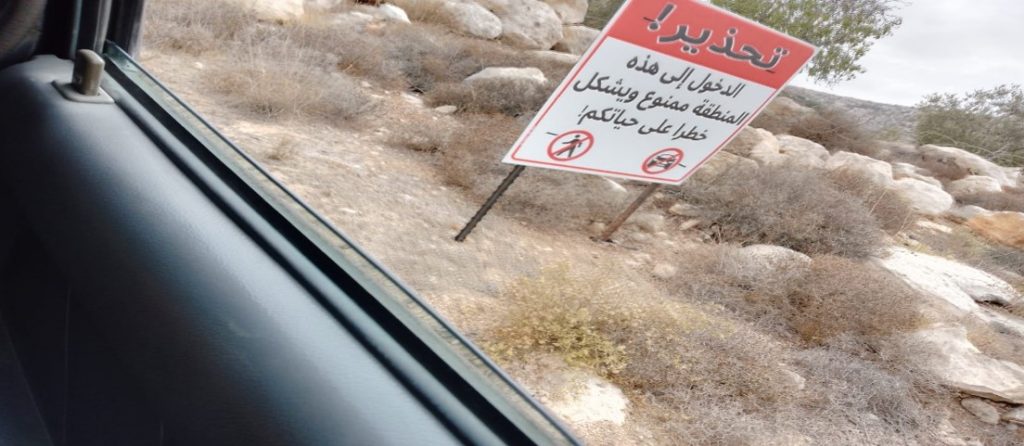
Settlement Expansion
According to PCHR’s field documentation, in 2024, the Israeli occupation authorities declared the seizure of 385 dunams of land in Hebron for the expansion of bypass road No. 60. The appropriation order included upgrading and rerouting the bypass road No. 60. As a result, these tree-planted lands were confiscated to serve the movement of settlers from Hebron to Bethlehem. It is worth noting that many of these lands are planted with grapevines, which are a primary source of the agricultural economy in Hebron[1].
PCHR has recently documented settlement measures in the area, which were as follows:
In early October 2024, the Supreme Council for Planning and Building in the “The Occupation Civil Administration” approved the legalization of the settlement outpost (Mitzpe Lachish / Givat Habestan) established on Palestinian-owned lands in Dura city, southwest of Hebron. The Supreme Planning Council published the detailed organizational plan, which bears the number (521/1/b), and which aims to legitimize the outpost and annex it to ‘Negohot’ settlement established on Palestinian-owned lands, with area size reaching (520 dunums).
According to the published plan, the Israeli authorities will connect the settlement outpost to the existing settlement and consider it one of its neighborhoods instead of establishing new settlements. They also plan to build 158 new settlement units in the outpost on an area of 811 dunams, where the “Negohot” settlement and the (Mitzpe Lachish – Givat Habestan) settlement outpost are located.
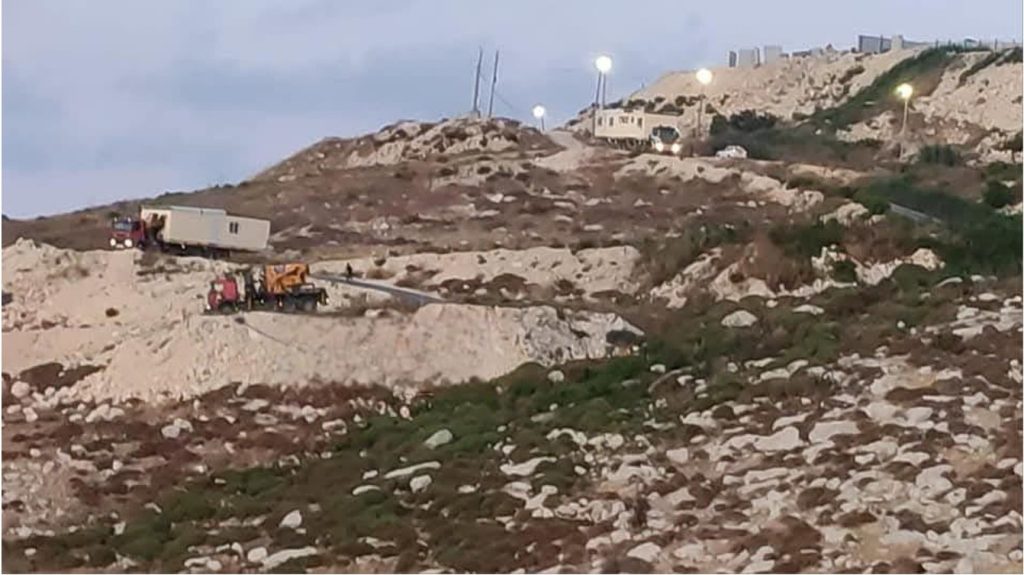
It is worth noting that the Mitzpe Lachish- Givat Habestan settlement outpost was established in 2001, with buildings made of tin plates and including mobile homes (iron caravans). The new settlement outpost will surround the nearby Palestinian village, Faqiqas, which part of its lands will be confiscated in favor of the new settlement outpost.
The Israeli authorities’ actions approve their intent to establish the largest settlement bloc in southern Dura, completely separating the city from its western villages, extending to the area leading to “Tel_Lachish “settlement behind the annexation wall in western the city.
In mid- April 2024, the Israeli authorities announced a plan to expand the “Telem” settlement, established on an area of 144 dunams on Tarqumiyah village’s lands in western Hebron. On 15 April 2024, the (Civil Administration – Subcommittee for Settlement Affairs) announced the submission of Detailed Plan No. (501/1/1).
According to PCHR’s field documentation, during the expansion works in the settlement, the Israeli authorities demolished Palestinians’ sheds and denied their access to their lands in al-Hardash and al-Tiba areas, adjacent to “Telem” settlement. Additionally, Israeli settlers assaulted Palestinian farmers in the mentioned areas.
Confiscation of “State-Owned Lands”
Amid the settlement expansion, the Israeli authorities relentlessly continue their efforts to solidify Israeli settlers’ presence in areas classified as Area (C) and near Palestinian villages by declaring the confiscation of rocky lands under the pretext of being “state-owned lands. Most of the settlement outposts in Hebron were established on lands confiscated by the Israeli authorities under this pretext. Also, Israeli settlers exploit these lands for settlement expansion by establishing pastoral and agricultural facilities on them. The latest such announcement occurred in Deir Razih village, southeast of Dura city, south of Hebron, where a group of settlers seized a mountainous area surrounding the village. On 05 December 2024, over the course of several days, the settlers began constructing an agricultural road on Palestinian-owned lands, denying residents access to their properties. On the first day, the settlers attack Palestinian farmers.
The village has a population of about 400 Palestinians, all of whom rely on agriculture and livestock farming for their livelihood. The area seized by the settlers is their only remaining open space.
Anwar Omar said to PCHR’s researcher:
“At approximately 16:00, on 15 December 2024, a bulldozer and a digger belonging to Israeli settlers arrived in the Deir Razih Mountain area. The bulldozer and digger then headed to the road connecting Bism and Deir Razih areas with the bypass road, adjacent to Abda village entrance, where they constructed and paved a new road. The following morning, I went there and found that a water well was damaged, with concrete blocks thrown on it. Meanwhile, an Israeli soldier arrived, and when I informed him that this is my land, he replied it is a state-owned land. He also informed me the villagers are prevented from reaching the land. On the same day, I went to the Israeli police station to file a complaint about the incident and provided the investigator with photos showing the settlers’ attack on the land. On 21 December 2024, my son Amr went to the land, where a settler suddenly appeared, pointed his weapon at Amr, and ordered him to leave, claiming his ownership of the land, and forbidding Amr from entering again. On 22 December 2024, the settlers closed with sand berms the road leading to the Bism and Abu Zanah villages, near my land. I am now unable to transfer water from the damaged well to my house, as it was used for irrigation, domestic use, and for sheep to drink. The pump of the well was also stolen by the settler.”

Israeli settlements in Hebron have isolated thousands of dunams of land behind and around them, preventing Palestinians from constructing or planting on these lands, including those on which settlements and outposts were established over the past years, the most recent of which occurred during the Israeli military aggression on the Gaza Strip.
The population of Hebron Governorate is estimated at about 842,000 people until 2024,2 according to the Palestinian Central Bureau of Statistics (PCBS), while the number of settlers is estimated at around 23,326, residing in 21 settlements and 47 outposts.
During their attacks, Israeli settlers forcibly displaced 450 Palestinians distributed across 10 communities in Hebron, seized their lands, and planted some of them in an attempt to alter the demographic reality in many Hebron’s neighborhoods in favor of the settlers. The situation in central Hebron City is equally difficult, as Israeli settlers have a heavy presence in the Old City, where many residents have been forced to leave due to the recurrent closure policies and strict inspection measures for Palestinians, under the pretext of protecting Israeli settlers.
PCHR condemns the expansionist settlement policies, which include land confiscations, home demolitions, and the forced displacement of Palestinian residents, constituting war crimes under the rules of international law.
PCHR calls on the international community to fulfill its responsibilities in stopping Israeli crimes, including settlement activity and ethnic cleansing. PCHR also urges the international community to compel Israel to reverse its policies of land seizure and imposition of realities on the ground that fragment Palestinian cities into isolated cantons surrounded by settlements and Israeli checkpoints. Furthermore, PCHR urges the Prosecutor of the International Criminal Court (ICC) to issue new arrest warrants against Israeli political and military leaders involved in settlement crimes.

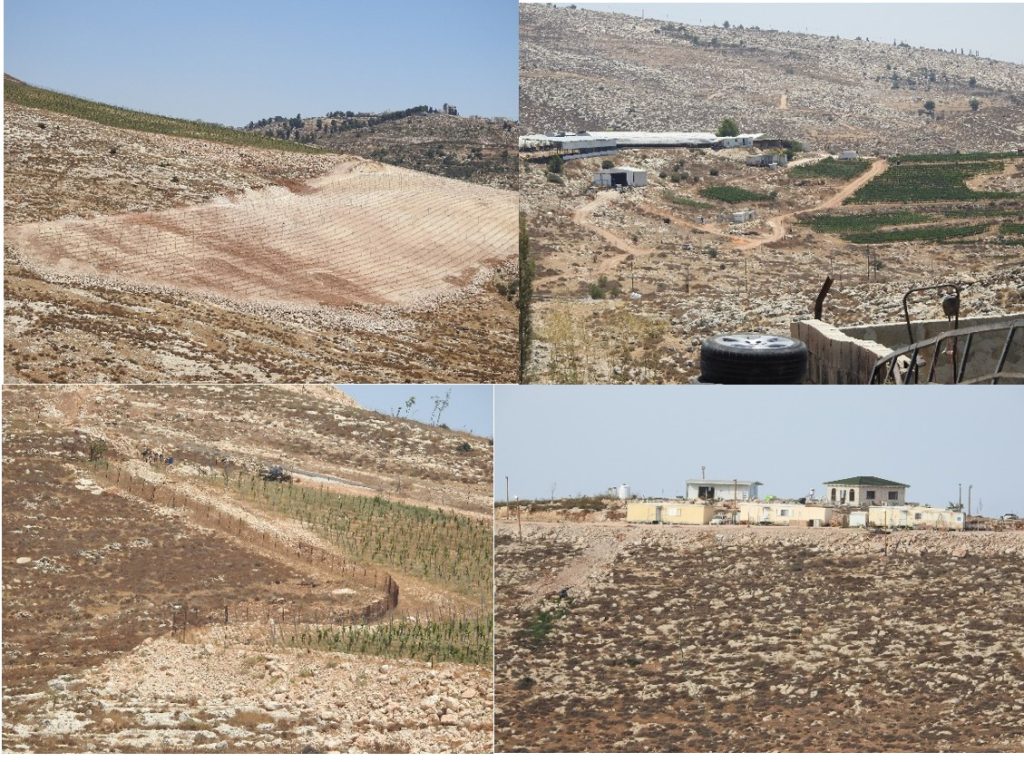
[…] For more details on settlement reality in Hebron, see: Field Report on Accelerated Settlement Activities in Hebron […]